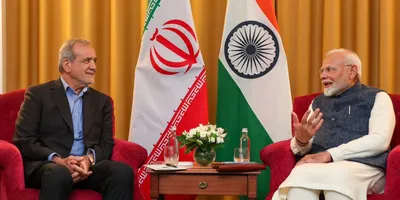
Amid concern over Hormuz closure, Modi calls for de-escalation in call with Iranian President
NEW DELHI : Prime Minister Shri Narendra Modi on Sunday called for dialogue and diplomacy to de-escalate the situation in West Asia as Iran’s threat to close the Hormuz Strait in retaliation to the strikes carried out by the United States added to India’s concerns over the conflict expanding in the region.
Modi received a call from Iranian President Mahmoud Pezeshkian just hours after the US bombed the nuclear facilities in the Persian Gulf nation. New Delhi refrained from condemning the US military strikes on Iran, but the prime minister expressed “deep concern” at the “recent escalations”.
India so far evacuated 1428 of its citizens from Iran after the West Asian Islamic Republic came under attack from Israel on June 13. An aircraft with 311 citizens of India from Mashhad in Iran landed in New Delhi at 4:30 p. on Sunday, while another would land at around 11:30 pm. Earlier, an aircraft with 290 citizens of India evacuated from Iran landed in New Delhi late on Saturday.
“Spoke with President of Iran @drpezeshkian. We discussed in detail about the current situation. Expressed deep concern at the recent escalations,” the prime minister posted on X after his phone call with the president of Iran.
“Reiterated our call for immediate de-escalation, dialogue and diplomacy as the way forward and for early restoration of regional peace, security and stability.”
Pezeshkian briefed Modi in detail about the situation and shared his perspective on the current situation in the region, especially the ongoing conflict between Iran and Israel.
Modi told Pezeshkian that India was on the side of peace and humanity. He emphasised the need for immediate de-escalation, dialogue and diplomacy as the way forward. He reiterated India’s support for an early restoration of regional peace, security and stability, according to a press release issued by the Ministry of External Affairs in New Delhi.
India has around 10000 citizens in Iran and about 26000 in Israel. Nearly nine million Indian citizens live and work in West Asia.
With 40 per cent of crude oil and 54 per cent of liquefied natural gas (LNG) imports of India coming through the Strait of Hormuz, Tehran’s move to close the strait between the Persian Gulf and the Gulf of Oman in retaliation to the attacks launched by Israel and the US on Iran triggered concerns in New Delhi.
Modi thanked Pezeshkian for the continued support being extended for the safe return and repatriation of the Indian community. The two leaders reiterated the shared commitment to continue to work for strengthening bilateral cooperation in different areas, including trade and economic cooperation, science and technology and people-to-people ties, according to the New Delhi’s press release on the phone call.
“Military action against Iran amid negotiations is the complete symbol of the groundlessness and emptiness of the US claims,” a press release issued by the Government of Iran quoted Pezeshkian telling Modi.
The US stated that it bombed Iran to stop it from building nuclear weapons.
But Pezeshkian, according to his office, told Modi that the production or use of nuclear weapons was religiously and morally prohibited and had no place in the “defence doctrine” of Iran.
Modi had, earlier on June 13, received a phone call from Prime Minister Benjamin Netanyahu of Israel after the Jewish nation’s armed forces launched attacks on Iran.
